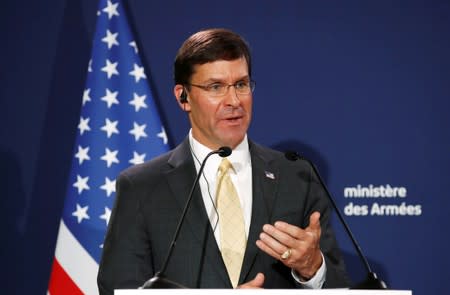U.S. military says not abandoning Kurds, condemns Turkish offensive

By Phil Stewart and Idrees Ali
WASHINGTON (Reuters) - The Pentagon strongly denied on Friday accusations that it had abandoned its Syrian Kurdish allies to a Turkish military onslaught, which it said was destabilizing the region and doing "dramatic harm" to U.S.-Turkey relations.
U.S. President Trump's decision to pull back troops from Syria's border with Turkey has been widely criticized in Washington as a tacit "green light" for a Turkish offensive that intensified on Friday, with Turkish air and artillery strikes on Kurdish militia.
"Nobody green-lighted this operation by Turkey, just the opposite. We pushed back very hard at all levels for the Turks not to commence this operation," Defense Secretary Mark Esper told a news briefing.
Esper and Army General Mark Milley, chairman of the Joint Chiefs of Staff, said they had spoken with their Turkish counterparts repeatedly in recent days, asking them to stop. But there was no sense that Turkey would do so, they said.
"I'm not seeing any indication or warnings of any planned stoppage of their military activity," said Milley, the top U.S. military officer.
Shortly after Milley spoke, Turkish President Tayyip Erdogan warned he would not stop his assault against Kurdish fighters no matter what anyone said. A war monitor said the death toll approached 100 from the first days of the assault, which began on Wednesday, including 17 civilians as well as dozens of Kurdish fighters and Turkish-backed Syrian rebels.
The Kurdish YPG is the main fighting element of the Syrian Democratic Forces (SDF) which have acted as the principal allies of the United States in a campaign that recaptured territory held by the Islamic State group.
The SDF now holds most of the territory that once made up Islamic State's "caliphate" in Syria, and has been keeping thousands of Islamic State fighters in jail and tens of thousands of their family members in camps.
Reuters reported on Tuesday an initial pause in counter-Islamic State operations by America's Kurdish allies, who are redirecting their focus to the border.
Although he acknowledged the Turkish assault was having an impact, Milley suggested some operations had continued, without elaborating. The United States this week moved two high-profile Islamic State prisoners being held by the Syrian forces out of Syria.
Milley said he had just spoken with the chief of the Turkish General Staff, General Yasar Guler, who he said "understands clearly" that the prisoners would be Ankara's responsibility in the areas where it carries out the offensive.
"We, the U.S. military, have no responsibility to ... secure those ISIS prisoners in Syria," Milley said. The Pentagon also stressed the need for Turkey to avoid doing anything to endanger U.S. forces inside Syria, which numbered about 1,000 prior to the incursion. Although U.S. troops had no intention of firing on Turkey, its North Atlantic Treaty Organization ally, the Pentagon noted they had the right to defend themselves, if needed.
Milley added that Turkey had been told of U.S. positions in Syria.
"The Turkish military is fully aware - down to explicit grid coordinate detail - of the locations of U.S. forces," he added.
Esper said he was repositioning additional troops around the region "to assist with force protection as necessary." He did not elaborate.
Esper also pushed back against criticism that the U.S. troop pullback was a tacit 'green light' to Turkey, portraying it instead as a decision taken to protect his forces.
"This decision was made to ensure American troops were not caught up in the fighting between Turkish and Kurdish forces," he said.
(Reporting by Idrees Ali and Phil Stewart; Additional reporting by Susan Heavey, Editing by Franklin Paul and Richard Chang)
